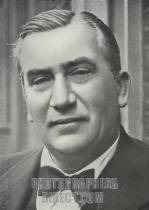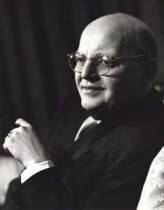
Albert Coates (April 23, 1882 – December 11, 1953) was an Anglo-Russian conductor and composer. Coates was born in Saint Petersburg, Russian Empire, the youngest of seven sons of an English father and a Russian mother. He studied at the conservatory in Leipzig, where his greatest teacher was Artur Nikisch. He worked for a time at Semperoper Dresden, and became conductor at Saint Petersburg's Mariinsky Theatre. He escaped with considerable difficulty from Russia in April 1919. He made his debut at the Royal Opera House, Covent Garden in 1914 with Richard Wagner's Tristan und Isolde. Dynamic in his approach and especially successful in Russian music, he introduced many new works to audiences, including pieces by Ralph Vaughan Williams, Arnold Bax and Alexander Scriabin, and, perhaps most notably, led the first complete London public performance of The Planets by Gustav Holst. In the 1920s and early 1930s he frequently worked with the London Symphony Orchestra. He made important early contributions to the representation of orchestral music on the gramophone, beginning in 1920 with Scriabin's Poème de l'Extase and afterwards conducting many excerpts from Wagner's Der Ring des Nibelungen and (in 1925) the complete Symphony No. 9 of Beethoven. He was the conductor for the 1930 premiere recording of Rachmaninoff's Piano Concerto No. 3 in D minor, with Vladimir Horowitz as soloist. In 1924-25 Coates shared conducting duties of the Rochester Philharmonic Orchestra with Eugene Goossens and was present at the birth of Vladimir Rosing's pioneering American Opera Company. In 1925 he gave the first stage performance outside Russia of Rimsky-Korsakov's opera The Invisible City of Kitezh. His compositions include the operas Samuel Pepys and Pickwick, a piano concerto and a symphonic poem The Eagle, dedicated to the memory of his former teacher Artur Nikisch, which was performed in Leeds in 1925. On November 13, 1936 the BBC broadcast the world's first televised opera, Coates' Pickwick, directed by Vladimir Rosing. Coates and Rosing launched a season of the British Music Drama Opera Company at Covent Garden the following week. When World War II broke out, Coates moved to Southern California. There he founded the Southern California Opera Association with Vladimir Rosing. A number of productions were mounted in conjunction with the W.P.A, among them Coates' opera Gainsborough's Duchess. In 1946 he settled in Milnerton, Cape Town, South Africa, with his wife Vera de Villiers. He died there in 1953.

Josef Alois Krips (8 April 1902 – 13 October 1974) was an Austrian conductor and violinist. Krips was born in Vienna and went on to become a pupil of Eusebius Mandyczewski and Felix Weingartner. From 1921 to 1924, he served as Weingartner's assistant at the Vienna Volksoper and as répétiteur and chorus master. Afterwards he became conductor of several orchestras, including a period as music director of the orchestra in Karlsruhe from 1926 to 1933. In 1933 he returned to Vienna as a resident conductor of the Volksoper. He also became a professor at the Vienna Academy of Fine Arts in 1935. He conducted regularly at the Salzburg Festival between 1935 and 1938. In 1938, the Nazi annexation of Austria (or Anschluss) forced Krips to leave the country. (Krips was raised a Roman Catholic, but would have been excluded from musical activity because his father was born Jewish). Krips moved to Belgrade, where he worked for a year with the Belgrade Opera and Philharmonic, until Yugoslavia also became involved in World War II. For the rest of the war he worked in a food factory. On his return to Austria at the end of the war in 1945 Krips was one of the few conductors who were allowed to work, since he had not worked under the Nazi régime. He was the first to conduct the Vienna Philharmonic and the Salzburg Festival in the post-war period. From 1950 to 1954 Krips was principal conductor of the London Symphony Orchestra. Afterwards he led the Buffalo Philharmonic Orchestra and the San Francisco Symphony (from 1963 to 1970). He made his Covent Garden debut in 1947 and his Metropolitan Opera in 1966, becoming a frequent guest conductor from then on. In 1970, he became conductor of the Deutsche Oper in Berlin. Between 1970 and 1973, he was the principal conductor of the Vienna Symphony. Krips died in Geneva, Switzerland in 1974 at seventy-two.
Charles Wakefield Cadman Pennsylvania Symphony Meredith Willson Symphony No.2 Los Angeles Philharmonic Orchestra Albert Coates Rec.: 1940 (live)
------------------------------------------
Anton Bruckner Symphony No.8 New York Philharmonic Orchestra
Josef Krips
Rec.:
3.12.1961 (live) | 
